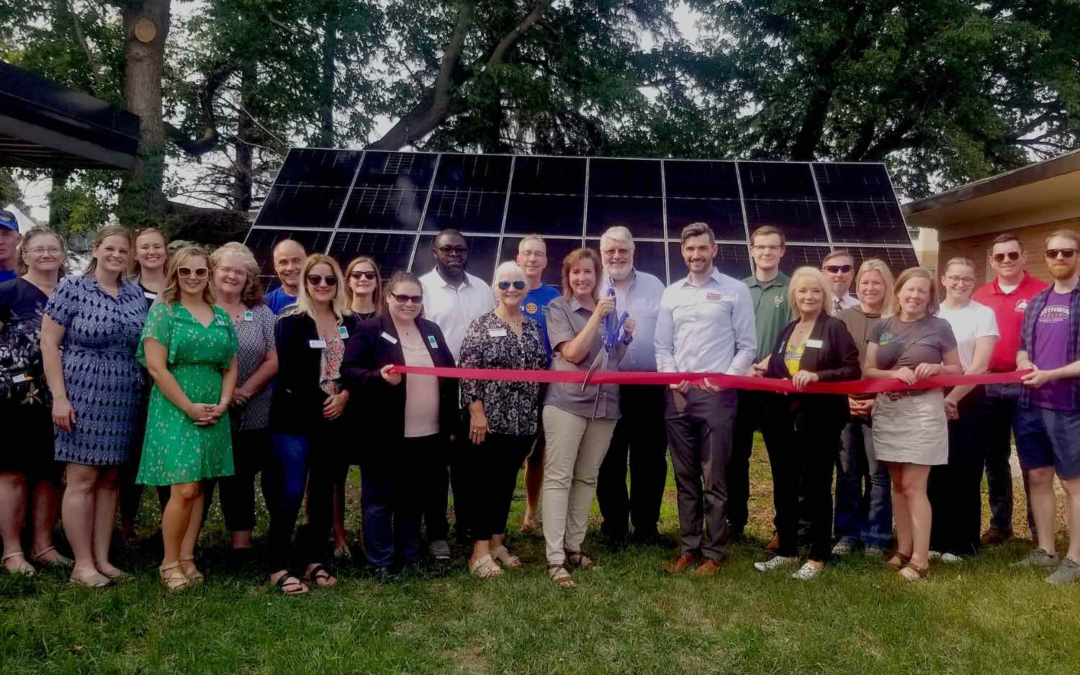
by Lauren Cohen | Jul 25, 2023 | Solar, Solar for Good
On Monday, July 24, The Rotary Club of Greater Portage County hosted a solar dedication ceremony to celebrate the completion of The Salvation Army Hope Center solar project. It will provide clean energy, reduce energy costs, and reinforce the Hope Center’s mission to provide secure and safe housing for the temporarily displaced and homeless in Stevens Point.
The Rotary Club of Greater Portage County selected the Salvation Army Hope Center solar project in alignment with Rotary International’s newly created Environmental Sustainability Area of Focus. The project will not only educate the community on the benefits of solar energy but benefit Stevens Point in a way that aligns with the Rotary’s mission. Thanks to this project, the Hope Center will be able to focus more resources on its work to provide shelter and warm meals for those in need.
“The Salvation Army Hope Center Solar Project was conceived as a way to increase community awareness of the environmental benefits of solar electric power while enhancing the Salvation Army’s resources to provide lodging and meals to families in need,” said Richard Zahn, Grants and International Team Lead of the Rotary Club. “Completion of the project has been a true collaboration with funding and support provided by three major grant partners, community donations, and local Rotarians.”
Northwind Solar installed the 7-kilowatt ground-mounted array, which is expected to produce 9,000-kilowatt hours of energy annually. This will offset around 15% of the Salvation Army Hope Center’s electrical demand.
“We are thrilled at Northwind to be able to provide renewable energy to an organization that serves the community,” said Dylan Jenkins, Project Manager with Northwind Solar. “We are always happy to help reduce the carbon footprint of our neighbors, and doing so with an establishment that’s dedicated to helping others is extra special.”
The Hope Center Solar Project received funding through various sources, including a panel donation from Solar for Good, a District Rotary grant, a Community Foundation of Central Wisconsin grant, and several individual donations. The combined support from these partners demonstrates the collective commitment to create a sustainable and thriving community.
By harnessing the power of solar energy, The Rotary Club of Greater Portage County and the Salvation Army Hope Center remain dedicated to driving positive change in the community while encouraging environmental stewardship. The success of this project stands as a testament to the transformative impact that can be achieved through collaborative efforts and a dedication to a cleaner and more sustainable future.
By harnessing the power of solar energy, The Rotary Club of Greater Portage County and the Salvation Army Hope Center remain dedicated to driving positive change while encouraging environmental stewardship. The success of this project stands as a testament to the transformative impact that can be achieved through collaborative efforts and a dedication to a cleaner, more sustainable future.
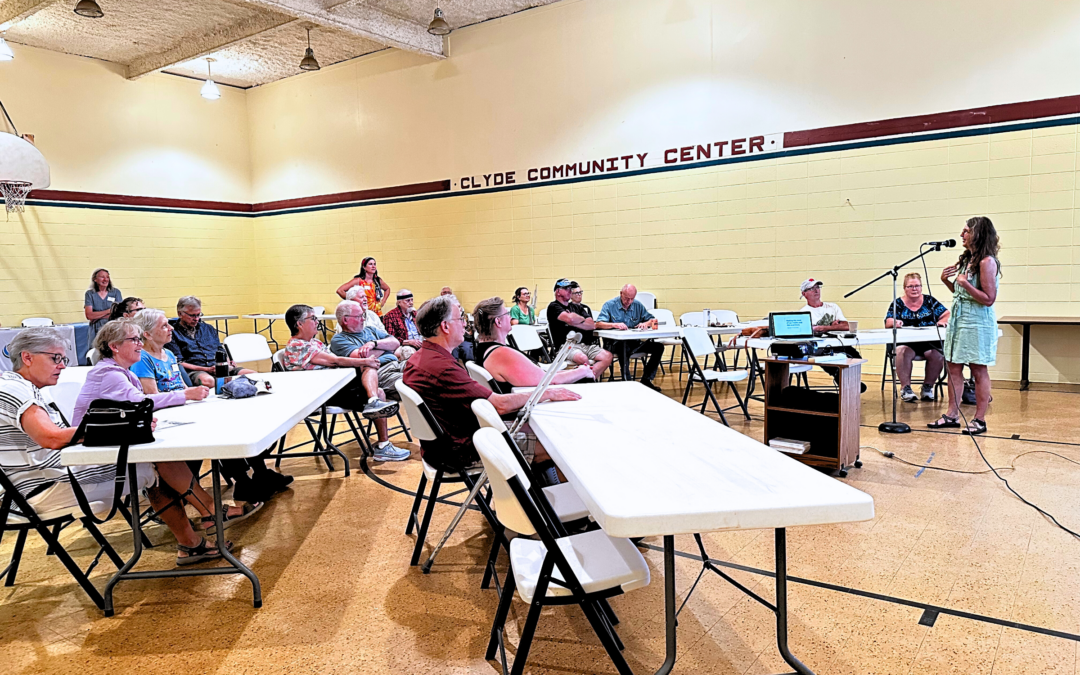
by Lauren Cohen | Jul 25, 2023 | Solar, Solar for Good
On Sunday, July 16, The Clyde Community Center hosted a dedication to celebrate and commemorate the completion of their 8-kilowatt solar array. Formerly an elementary school, the Clyde Community Center’s mission is to foster community by providing a space for Avoca, WI, residents to host programs or participate in recreational activities.
The ground-mounted solar array is projected to produce 10,000-kilowatt hours of annual energy, offsetting 100% of the community center’s current usage. This transition to solar power is just the first step in the Clyde Community Center’s long-term vision of implementing energy-efficient upgrades.
“Our former grade school means a lot to the residents of our township as a public gathering place, but it needs upgrades,” said Juniper Sundance, Solar Champion of the Clyde Community Center.
Planned upgrades include replacing and adding insulation, installing energy-efficient lighting, and replacing the classroom air conditioning units and wall furnaces with heat pumps. These improvements will optimize the solar system’s performance by minimizing energy waste and ensuring the community center maximizes its renewable energy potential.
This project was made possible through various financial rebates and grants, including an $11,500 Focus on Energy Rebate and a $1,200 grant from Solar for Good. Clyde Community Center also received several donations from its community members.
The Clyde Community Center solar project can be largely accredited to the town’s residents who already use solar to power their homes and understand how beneficial additional solar would be for their community. “Living in an area without much infrastructure, we are aware of our need for sustainable systems,” said Sundance. “We see a potential for educating our neighbors on solar.”
The involvement of Clyde residents serves as a powerful testament to the idea that people are far more likely to install solar when they see someone they know and trust already using it successfully. This solar installation is another example for others within the township to follow.
Clyde Community Center’s solar installation demonstrates the organization’s commitment to the environment as well as its residents. By installing this system, the center can continue serving the town for years to come.
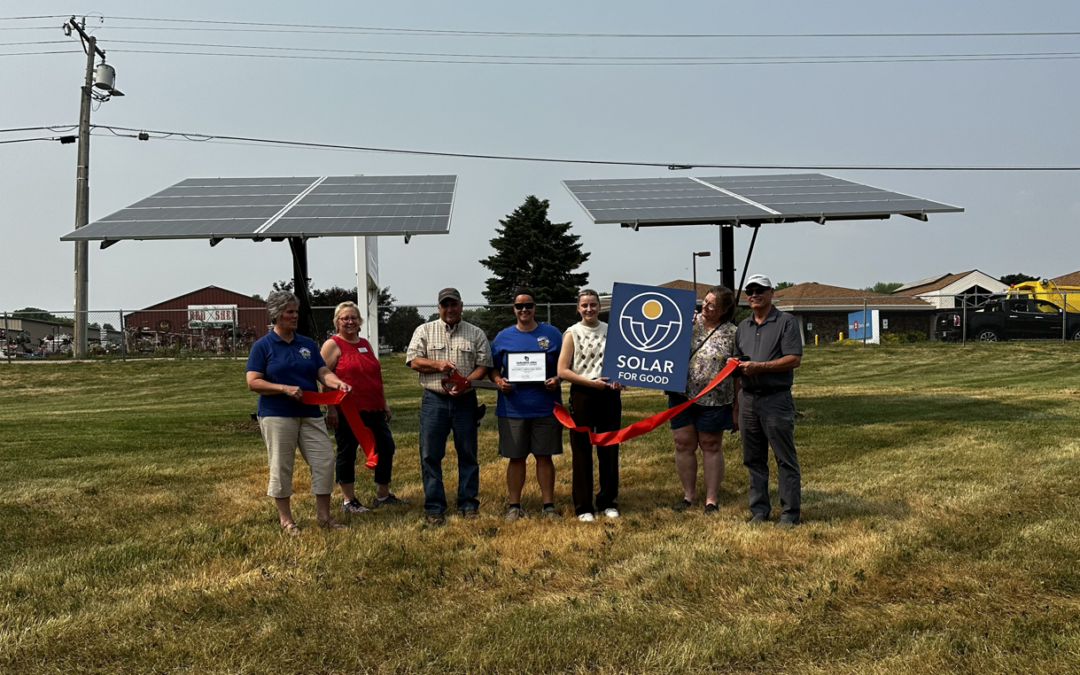
by Lauren Cohen | Jun 29, 2023 | Programs, Solar, Solar for Good
On Wednesday, June 13th, The Friends of the Sauk County Fairgrounds hosted an event to celebrate the completion of their 19-kilowatt solar array. The Friends of Sauk County Fairgrounds is a nonprofit whose mission is to help fundraise and support the preservation of the historic Sauk County Fairgrounds.
Located in the City of Baraboo, the 24-acre Sauk County Fairgrounds is now home to two solar arrays, totaling 52 panels. These installations, completed by All Sky Energy, are projected to generate over 26,000-kilowatt hours of electricity annually. By doing so, they will contribute to a 43% reduction in the fairgrounds’ yearly electric utility costs.
Steeped in a rich history spanning more than 150 years, the Sauk County Fairgrounds remains home to several original structures, a testament to their enduring legacy. These fairgrounds hold immense significance as a venue for historical preservation. While the COVID-19 pandemic disrupted their usual lineup of events, it also presented an opportunity for the Sauk County Fair to prioritize cost-saving measures, ensuring its continuation for another 150 years.
For the youth community in the region, the Sauk County Fair has served as a valuable educational resource, imparting knowledge about the vital role of agriculture. “By installing solar energy, we are showing a continued commitment to providing a safe venue for our youth to develop these skills, a long-term solution for cost savings, and the importance of helping save the environment at the same time,” said Amy Bible, treasurer of the Friends of the Sauk County Fairgrounds.
The Friends of the Sauk County Fairgrounds received funding from various organizations, including Focus on Energy and Solar for Good. Solar for Good, a program initiated by RENEW Wisconsin and the Couillard Solar Foundation, aims to promote and support solar power among mission-based nonprofits in Wisconsin. The collaborative efforts of these organizations have enabled the realization of these solar installations.
The Sauk County Fair prides itself on its inclusive nature, welcoming families of all income levels to explore the grounds at no cost. The installation of these solar arrays will not only contribute to preserving the fair’s legacy for future generations but also serve as a powerful symbol of environmental stewardship and technological progress for the residents of Sauk County.
The funds saved through this sustainable initiative will be redirected towards public education initiatives on agriculture and the preservation, maintenance, and upkeep of the fairgrounds’ century-old buildings and grounds. This forward-thinking approach ensures that the fair will continue to serve as a beacon of heritage, knowledge, and enjoyment for years to come.
Completing these solar arrays at the Sauk County Fairgrounds marks a momentous achievement in their mission to preserve and promote the historic fairgrounds. Through installing these solar arrays, the Friends of the Sauk County Fairgrounds are embracing sustainable practices and demonstrating their commitment to providing a safe venue for youth development, achieving long-term cost savings, and fostering environmental responsibility. This project is proof of the combined efforts of different organizations and highlights the long-lasting importance of the Sauk County Fair. It ensures that future generations can still enjoy its fascinating history and everything it provides.
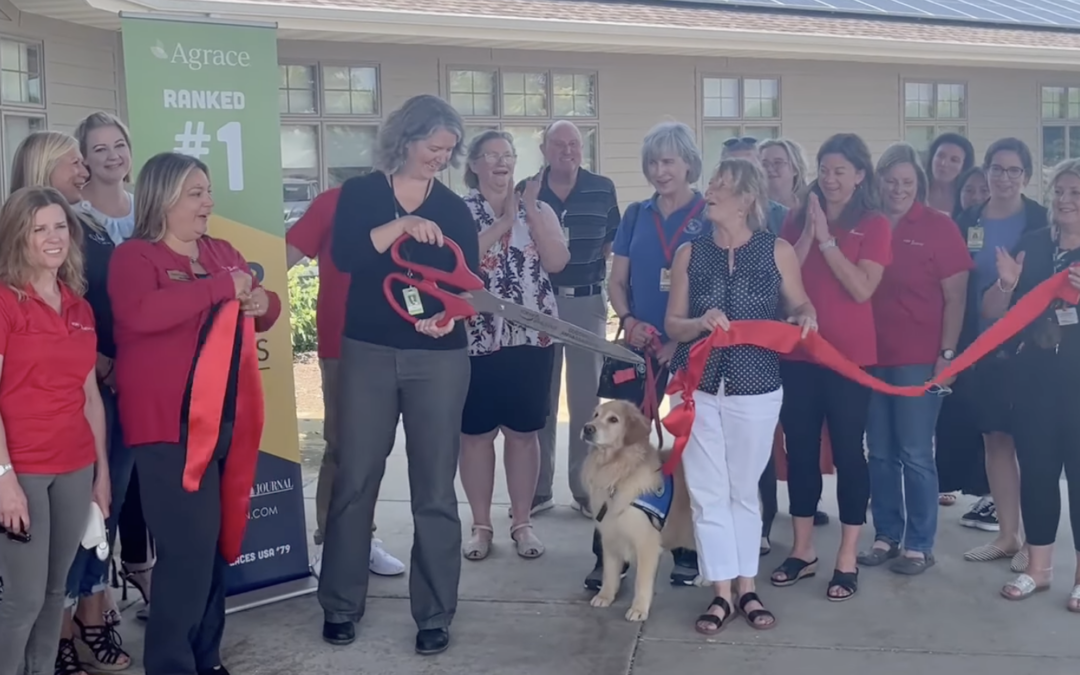
by Lauren Cohen | Jun 29, 2023 | Programs, Solar, Solar for Good
On Tuesday, June 20th, Agrace Hospice Care commemorated the completion of its 87-kilowatt solar array with a ribbon cutting. Founded in 1978, Agrace Hospice Care is a nonprofit whose mission is to provide personalized care and support for life’s changing health needs.
Installed by Full Spectrum Solar, their 212-panel solar system is projected to produce 343,481 kilowatt hours annually, offsetting 31% of the organization’s annual usage. This solar system is just one aspect of Agrace’s plan for carbon neutrality by 2025. “There are absolutely financial savings that we will begin to enjoy a decade from now, but that’s not high on our reasons for doing this,” said Lynn Sexten, CEO of Agrace. “Making sure our services are available to anyone, regardless of their ability to pay, means we’re making sure we’re being a good corporate citizen, a good community partner, and helping to further cleaner air in our local communities.”
This project was made possible thanks mainly to Focus on Energy incentives and a Solar for Good grant. Created in partnership with the Couillard Solar Foundation, RENEW Wisconsin’s Solar for Good program provided Agrace Hospice Care with a $10,000 grant to use toward their solar project.
As a nonprofit, Agrace strives to allocate as many resources as possible to direct caregiving and community services. The funds saved through this solar project will be reinvested in Janesville and other areas, ensuring the continued provision of exceptional care to those in need. By embracing solar energy and other initiatives that reduce its carbon footprint, Agrace sets an example for sustainable practices within its organization and the wider community.
To achieve their ambitious carbon-neutral goals, completing the solar array at their Janesville facility is just the beginning of Agrace’s commitment to renewable energy. They also have plans to install a solar array at their Madison facility, further emphasizing their dedication to environmental stewardship. Agrace aims to raise awareness about the positive impact of solar power on reducing operational costs, allowing for increased investment in patient care and community programs for years to come.
By embracing solar energy, Agrace demonstrates its determination to minimize its carbon footprint and allocate resources where needed most. As they continue expanding their renewable energy initiatives, Agrace paves the way for a brighter and more sustainable future for their organization and the communities they serve.
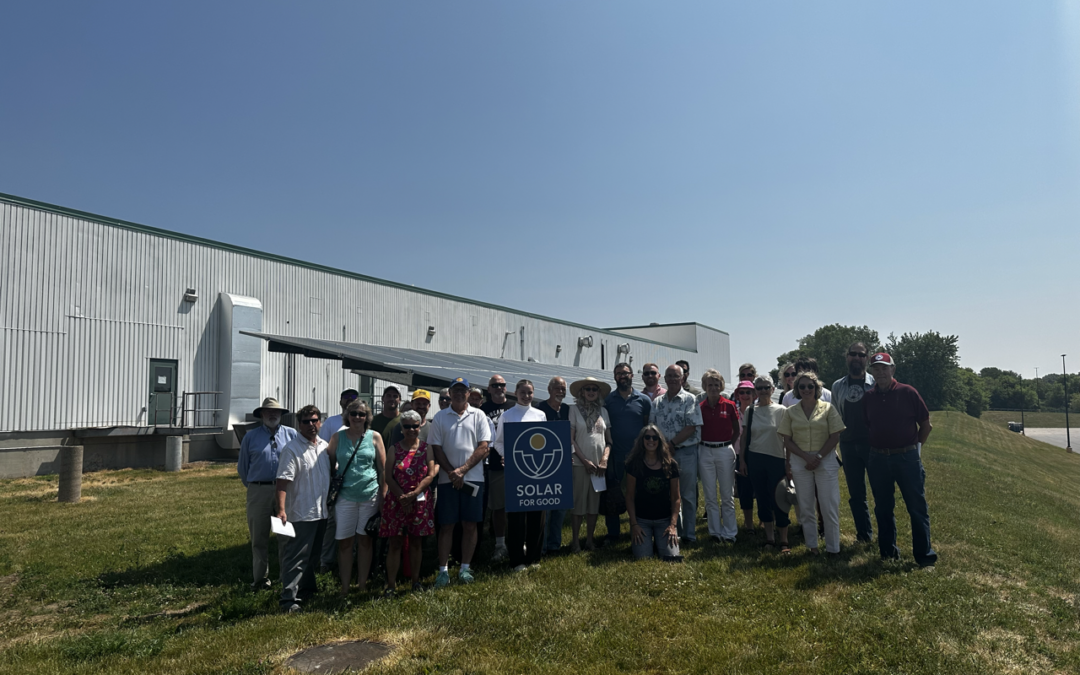
by Lauren Cohen | Jun 29, 2023 | Programs, Solar, Solar for Good
On Tuesday, June 20th, Vernon Economic Development Association (VEDA) celebrated the completion of their 100-kilowatt solar array. Vernon Economic Development Association is a nonprofit that is dedicated to strengthening its community through economic development by bringing state and federal resources to its region.
The 180-panel ground-mounted array, designed and installed by Ethos Green Power Cooperative (EGPC), was installed on the Food Enterprise Center and is projected to produce nearly 130,000 kilowatt-hours annually, offsetting approximately 60% of the shared space usage.
“The electricity generated supports our common areas that serve small tenant businesses and refrigeration coolers produce and dairy produce storage for VEDA’s Community Hunger Solutions Program, which brings nutritious food to community members who lack access,” said Susan Noble, Executive Director of VEDA. This solar project is a critical part of our sustainability plan and a long-term solution fostering a stronger, more stable community.”
Several grants made this project possible, including Focus on Energy, Solar Moonshot, the BQuest Foundation, Associated Bank, GoMacro, Vernon Communications, EGPC Community Power Program, and individual community member donations.
VEDA also received a grant from Solar for Good, a RENEW Wisconsin program created in partnership with the Couillard Solar Foundation to help nonprofits go solar. Solar for Good awarded the organization half of the solar panels needed for their project.
This solar project will save the organization valuable dollars, which can then be reinvested into its mission and community. “It is clearly a powerful investment which will save $300,000 in electricity costs over 25 years that can be put towards other operations and helping more businesses grow,” said Mike Breckel, president of VEDA’s Board of Directors.
“Being able to utilize and demonstrate solar power to the community and the region is consistent with our mission to create sustainable economic growth that increases the prosperity and well-being of the people of this region while protecting and enhancing the area’s unique environment, which is the foundation of our rural lifestyle and quality of life,” continued Noble.
With over 20 businesses located at the Food Enterprise Center, this solar array will have a wide-reaching impact on its tenants and customers. Installations like VEDA highlight the long-term economic benefits of renewable energy investments. As a well-known and well-respected organization in their region, this solar installation will be an example to other community members.
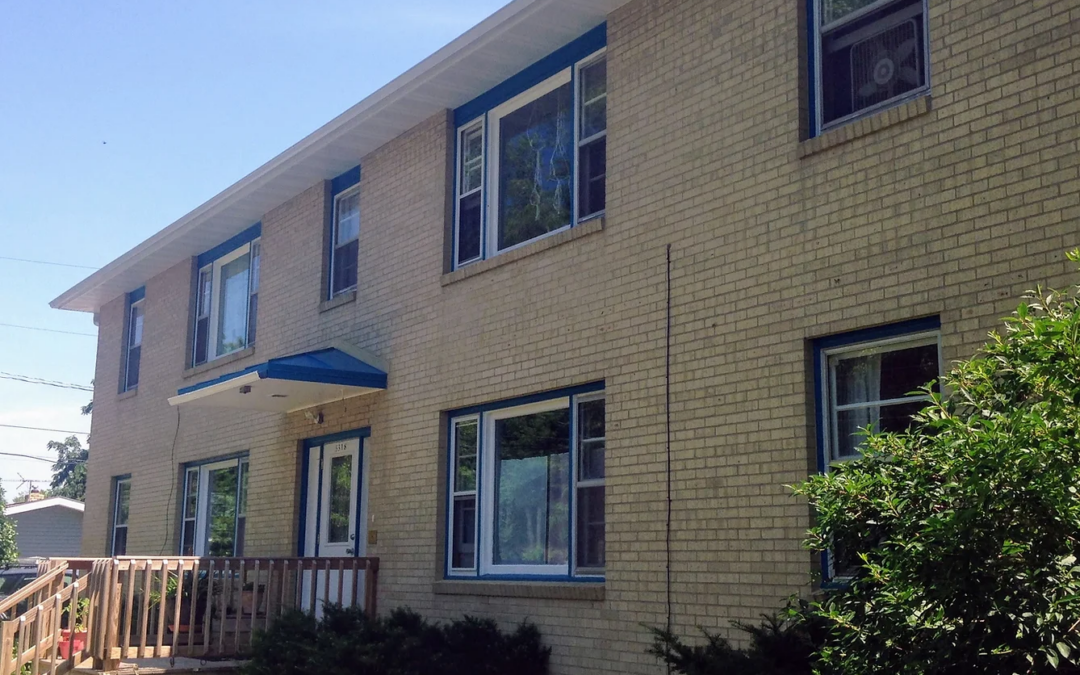
by Lauren Cohen | Jun 29, 2023 | Programs, Solar, Solar for Good
On Friday, June 15, RENEW Wisconsin joined Madison Area Cooperative Housing Alliance (MACHA) to celebrate the completion of their 14.4-kilowatt solar array, made possible in part by MadiSUN Backyard Solar and Solar for Good grants. MACHA is a nonprofit organization that seeks to promote resilience and equity in the Madison area by supporting the continuation and creation of cooperative housing.
This solar system was installed by Full Spectrum Solar and is projected to offset 97% of the building’s electricity usage for Perennial Co-op’s 11-person house, ensuring long-term affordability for its residents. The cooperative house will benefit from reduced utility bills by leveraging solar energy.
The installation was made possible through the support of several grants and incentives. The MadiSUN Backyard Grant, a program that awards grants to Madison-based nonprofits, awarded MACHA $9,725. In addition, MACHA also received a grant from Solar for Good, a program whose mission is to foster solar expansion among Wisconsin nonprofits. MACHA also received funding from Focus on Energy and loan support from Greenpenny.
The completion of this solar array comes at a critical time within the Madison housing market. “With housing costs in Madison increasing, more and more people are priced out of the housing market,” said Steve Vig, Secretary with MACHA. “Cooperative housing ensures long-term affordability, as does the transition to renewable energy infrastructure such as solar. Perennial Co-op sets an example for long-term affordability, climate-resiliency, and multi-generational living.”
Madison Cooperative Housing Alliance plans to use Perennial Co-op’s solar array as an example that other similar organizations can replicate. “We hope that Perennial Co-op’s new solar array can serve as a model for other cooperative houses in Madison,” said Gabrielle Hinahara, MACHA Board Member. “MACHA would be excited to collaborate with more co-op houses interested in installing solar. These projects are a win-win because they contribute to our community’s environmental sustainability and provide long-term financial sustainability for our cooperative houses, which often house residents with modest incomes.”
The completion of this solar array marks a significant milestone for promoting resilience, affordability, and sustainability in the Madison housing market. With housing costs rising, cooperative housing, coupled with renewable energy infrastructure, presents a solution for long-term affordability and sustainability. With this installation completed, other organizations have a laid-out path to follow suit, fostering an environmentally and economically viable community for Madison residents.






